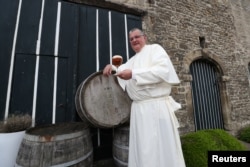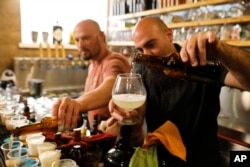Beer lovers --- and makers -- are always looking for new and interesting versions of the drink. But recent efforts in Israel and Belgium are aiming to bring back beers from long ago.
It has been 220 years since beer was produced at Grimbergen Abbey in Belgium, but the centuries-old tradition is set to return there. The abbey is home to a group of monks. Monks first began brewing beer at the Grimbergen Abbey in the 13th century. But they stopped doing so in the late 1700s, after French troops damaged parts of the property – including the brewing area.
Father Karel Stautemas is one of 11 religious members who now live in the abbey. This month, he announced plans for a newly built brewery inside the abbey. More than 100 reporters, city leaders and beer lovers gathered in the town of Grimbergen for his announcement.
Father Karel said, “For us, it’s important to look at the heritage, to the tradition of the fathers for brewing beer because it was always here.”
“Brewing and religious life always came together,” he added.
Grimbergen Abbey expects to produce its first beer by late 2020.
The abbey has been linked to commercial beer makers since the 1950s, when local brewer Maes asked the monks to use the Grimbergen name on its “abbey beer.”
The monks will aim to follow centuries-old methods for manufacturing beer. The directions come from a collection of old books found inside the abbey.
Grimbergen’s monks also will follow the rules of Belgium’s Trappist beer makers, although they are not members of the Trappist order. Such rules require the religious workers to brew the beer within abbey walls and use any money earned to repair the building and support charitable causes.
The interest in ancient brewing methods is not limited to Belgium. Researchers in Israel announced recently they have removed yeast from the remains of containers found at ancient sites. They have used the remains to create a beer similar to the kind that Egyptian pharaohs enjoyed thousands of years ago.
Beer was a popular drink in ancient Egypt and Mesopotamia. Early Egyptian writings describe many different brews, including “iron beer,” ″friend’s beer,” and “beer of the protector.”
Last Wednesday, researchers from Jerusalem’s Hebrew University and Tel Aviv University presented a beer made with yeast that came from an ancient jar.
Other researchers have developed drinks based on ancient directions for making beer and studies of remains on ancient ceramics. But the Israeli scientists say this is the first time beer has been made from actual ancient yeasts.
Hebrew University microbiologist Michael Klutstein said, “What we discovered was that yeast can actually survive for a very, very long time without food.”
The researchers plan to combine ancient methods with more modern ways to brew a beer that could one day be produced in large amounts.
I'm Ashley Thompson
Ashley Thompson adapted this story based on reports by VOA News, Reuters and the Associated Press. George Grow was the editor.
_______________________________________________________________
Words in This Story
beer - n. an alcoholic drink made from malt and flavored with hops
monk - n. a member of a religious community of men who usually promise to remain poor, unmarried, and separated from the rest of society
brew - v. to make (beer, ale, etc.)
heritage - n. the traditions, achievements, beliefs, etc., that are part of the history of a group or nation — usually singular
yeast - n. a type of fungus that is used in making alcoholic drinks (such as beer and wine) and in baking to help make dough rise
site - n. a place that is used for a particular activity
pharaoh - n. a ruler of ancient Egypt
jar - n. a clay container that has a wide opening










